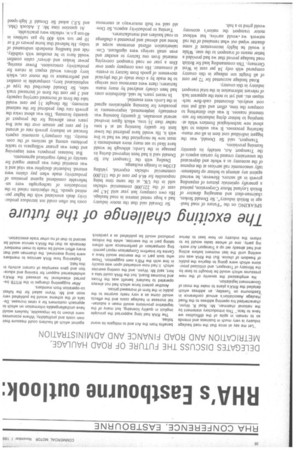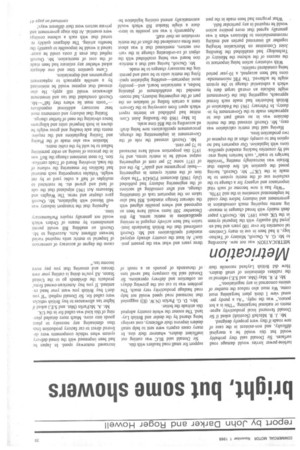The exciting challenge of the future
Page 40

Page 41

If you've noticed an error in this article please click here to report it so we can fix it.
SPEAKING on the "Future of road haulage in British industry", Sir Donald Stokes, chairman-elect and managing director of British Leyland Motor Corporation, painted a generally optimistic picture of expanding growth in all sectors. However, he warned against any attempt to bolster up fundamentally uneconomic rail services at the expense of the economy as a whole and deprecated the uncertainty created by certain aspects of the Transport Act, notably its quantity licensing provisions.
Transport, said Sir Donald, was the biggest individual cost item in all our manufacturing processes. It was useless to talk about new technological frontiers while attempting to bolster dying industries for sentimental reasons. It was also disturbing to compare the time, effort and skill put into cost analysis, discounted cash-flow techniques etc. and yet to note the apparent lack of relevant information in the total transport indu.stry in this country.
Road haulage accounted for 72 per cent of all freight ton mileage in this country compared with only 34 per cent in West Germany. This commanding lead for British road haulage proved that we had provided a better means of transport to the user. While it would be highly inconvenient if some disaster wiped out what remained of the rail network we .would survive, but without motor transport the nation's economy would grind to a halt. Sir Donald said that the motor industry had a huge vested interest in road haulage. His own company last year sold 34.7 per cent of the 225,000 commercial vehicles sold in the UK, at the same time being responsible for 46.6 per cent of the 135,000 commercial vehicles exported, yielding £150m in foreign exchange.
Dealing with the Transport Act Sir Donald said it had been improved during its passage in the Lords; although he would have liked to see many more amendments it must now be recognized that we had to live with it. He would have preferred the lower limit for quality licensing set at 4 tons rather than 31 tons, which figure involved seveial anomalies. If quantity licensing was eventually implemented, improvements in procedure for licensing applications agreed in the Lords were essential.
In recent years, he said, distribution costs had been closely analysed by many manufacturers; there were enormous cost savings to be made by a close study of the physical movement of goods from factory to eventual consumer. His own company spent over fkm a year on road transport conveying material from one factory to another and even small savings were significant. Containerization offered enormous scope at home and abroad and presented a challenge to road hauliers and manufacturers.
Turning to productivity aspects, Sir Donald said we built motorways at enormous costs but often could not introduce productivity deals associated with the higher permitted speeds. The objections raised to the introduction of tachographs were unbelievable considered against promises of productivity made when pay claims were entered. Industrial discipline was vital and it was essential there was greater regard for sanctity of freely negotiated agreements.
But business prospects were improving and there was greater willingness to tackle problems among all sections of the community. His company's economic experts forecast an industry growth rate of around 61 per cent per annum over the next five years even allowing for the prospect of quantity licensing. This was about twice the growth rate they predicted for the national economy. He thought 31 per cent would take the form of increased carrying capacity and 3 per cent the form of increased truck sales. Sir Donald described the type of' sophisticated lorry, comparable in comfort and performance to the motor car, which lorry drivers would expect in return for productivity concessions. Power steering, power brakes and drivers' cabin comfort would have to be excellent with visibility, ride and handling standards undreamed of today. He believed that horse powers of 8 or 10 per ton with 400 hp gas turbines in 40-ton g.v.w. vehicles were practicable.
At question time Mr. J. Adcock (Met. and S.E.) asked Sir Donald if high-speed
turbine-power lorries would damage road surfaces. Sir Donald said they probably would but this would be a marginal difficulty, and non-existent in the case of new roads if they were properly designed.
Mr. J. B. Mitchell (Scottish) asked if Sir Donald favoured local productivity agreements or national bargaining. "This is a hot potato," was the reply. "As a purely personal view I think plant bargaining must come. We must also reduce the number of unions concerned in any negotiations."
Mr. P. R. May (Met. and S.E.) referred to the ruthless elimination of small dealers. How did British Leyland reconcile their support for small road hauliers with this.
Sir Donald said BLC was cutting out inefficient dealers, whatever their size. In many cases experts were sent to help small dealers improve their efficiency, cost savings being shared by the dealer and British Leyland. The sooner the whole country adopted this attitude the better.
Mrs. D. G. Parkin (N.W. (E)) suggested that increased road speed would not help road haulage productivity very much. The problem was to cut out the growing delays on collection and delivery operations. Sir Donald said his company had saved tens of thousands of pounds as a result of increased motorway speed. In Japan he had been impressed with the timed-delivery system when vehicle components were delivered direct to car factory production lines thus eliminating any necessity to place goods into store. Much more detailed planning of this kind was called for in the UK.
Mr. A. McFarlin (Met. and S.E.) asked if higher tax allowances to buy British vehicles were called for. Sir Donald replied: "If you don't buy British you want your head examined. If you buy American-owned firms' products the dividends go to the United States. All you're doing is cutting your own throats and ensuring that you pay more income tax."




































































































